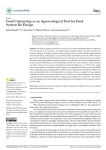Tittarelli F., Saba A., Di Pierro M., Ciaccia C. (2022). Food citizenship as an agroecological tool for food system re-design. Sustainability, 01/02/2022, vol. 14, n. 3, p. 1-18.
https://doi.org/10.3390/su14031590
https://doi.org/10.3390/su14031590
| Titre : | Food citizenship as an agroecological tool for food system re-design (2022) |
| Auteurs : | F. Tittarelli ; A. Saba ; M. Di Pierro ; C. Ciaccia |
| Type de document : | Article |
| Dans : | Sustainability (vol. 14, n. 3, February 2022) |
| Article en page(s) : | p. 1-18 |
| Langues : | Anglais |
| Langues du résumé : | Anglais |
| Catégories : |
Catégories principales 08 - ALIMENTATION ; 8.1 - Consommation Alimentaire. ComportementThésaurus IAMM AGROECOLOGIE ; SYSTEME AGROALIMENTAIRE ; CONSOMMATION ETHIQUE ; IMPACT SUR L'ENVIRONNEMENT ; ENQUETE AUPRES DES CONSOMMATEURS ; ALIMENT BIOLOGIQUE POUR HOMME ; PRATIQUE ALIMENTAIRE ; FRUITS ET LEGUMES ; COMPORTEMENT DU CONSOMMATEUR ; CONSENTEMENT A PAYER ; ITALIE |
| Résumé : | The modern agrifood system has a strong socio-economic and health impact on stakeholders, from producers to consumers. According to agroecological studies, a key factor for the food system to change is a stronger connection between farmers and consumers and the implementation of Food Citizenship. In this paper, we present the results of preliminary research on the consumer approach to vegetable and fruit purchase in Italy. Our main aim was to group consumers according to the major criteria guiding their food purchase patterns, to outline the main criteria underpinning their choices and assess their degree of environmental, economic and social awareness. Cluster analysis was able to pick out two groups with significant statistical differences, i.e., 55.4% of the sample showed, through their consumption patterns, deeper environmental and social concerns. Specifically, when comparing food purchasing patterns, ethical choices, biodiversity and global warming were the most influential factors to discriminate the two clusters. Moreover, organic food consumption confirmed its status as an acknowledged way to reduce the environmental impact of the modern agrifood system for which respondents are willing to pay a higher price compared to conventional food. Nonetheless, the whole sample of respondents perceived organic food as expensive and not good for value. |
| Cote : | En ligne |
| URL / DOI : | https://doi.org/10.3390/su14031590 |







